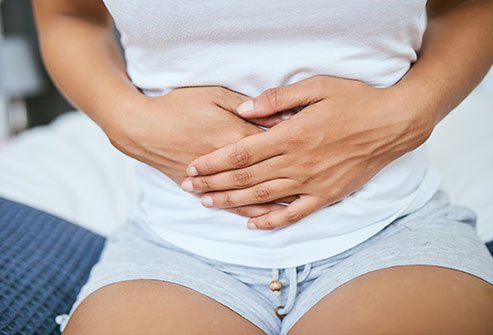Can Early Pregnancy Symptoms Be the Same as Period Symptoms?
What are early pregnancy and periods?

It is easy to confuse early pregnancy and the symptoms of your menstrual cycle, which is usually referred to as your period. There are many similarities in these symptoms. Both may be uncomfortable or painful.
It may be difficult to know if you’re pregnant because early pregnancy symptoms are so similar to period symptoms. If you were not planning a pregnancy, you may go months without knowing that you’re pregnant. This is why it’s helpful to know the differences and similarities of early pregnancy and period symptoms.
What is pregnancy?
Pregnancy is the period of time when your baby develops in your womb. Pregnancy lasts about 40 weeks, or about 9 months. It is broken up into three trimesters.
There are different expectations for each trimester. Some people may not know that they’re pregnant during their first trimesters.
What is a period?
Menstruation is when a woman bleeds due to the periodic, usually monthly, shedding of her uterine wall lining. Menstrual blood and tissue discharge from the cervix in your uterus and passes through your vagina.
Your uterine lining thickens each month to prepare for a pregnancy. When that doesn’t happen, the lining is shed. Women’s cycles and flows are all unique.
Signs of early pregnancy and period symptoms
Most period cycles tend to have a heavier blood flow than the spotting of blood that can occur in early pregnancy. However, there are other symptoms that can be the same for both early pregnancy and a period.
Signs of early pregnancy
If you were not expecting or planning to become pregnant, you may get symptoms of early pregnancy that you could mistake for period symptoms. Early pregnancy symptoms include:
- A missed period
- Fatigue
- Smell sensitivity
- Mood swings
- Breast changes
- Frequent urination
- Bloating
- Morning sickness
Many of these symptoms could be the result of switching your birth control medication or the effects of stress. They might also be indicators of other conditions.
If you have these symptoms and suspect that you may be pregnant, you should see your doctor for an accurate test.
Symptoms of a period
The changes in your hormone levels before your period cause physical and emotional changes. Those changes are known as premenstrual syndrome (PMS).
Typical symptoms of PMS include:
- Feeling bloated
- Breast tenderness
- Mood swings
- Feeling irritable
- Acne breakouts or oily hair
- Loss of interest in sex
It is completely normal to experience the physical and emotional symptoms of PMS. Some emotional or mental symptoms include:
- Tension or anxiety
- Depression, or feelings of sadness
- Trouble concentrating and memory issues
Causes of early pregnancy and periods
Early pregnancy symptoms are caused by the baby growing in your womb. The extra hormones and bodily changes that occur over the course of 9 months will have effects on your body.
Your period symptoms occur monthly or close to it in order to shed to the lining of your uterus. PMS is the cause of physical and emotional symptoms of your period.
Causes of early pregnancy
Focusing on your preconception health can help reduce your future pregnancy symptoms. Preconception health can begin years before you decide to have a child. Doing this may help relieve your symptoms later when your hormones have increased and they start to appear.
It’s okay if you did not plan your pregnancy. There are remedies to help with your symptoms in the beginning as your body changes.
Causes of a period
There’s no concrete research behind why PMS happens. It may be linked to your changing hormone levels during your menstrual cycle. PMS is not caused by stress or mental issues, but these factors can worsen your symptoms.
Some lifestyle factors could play a role in your PMS symptoms. Factors that could worsen symptoms include:
- Smoking
- Stress
- Little to no exercise
- Not enough sleep
- Taking in too much alcohol, caffeine, salt, red meat, or sugary foods
Diagnosing early pregnancy and periods
You may have an easier time determining which symptoms you’re having if you start by tracking your symptoms on a calendar each month. This will help you determine how you’re feeling and notice any patterns you may have including PMS.
Your doctor will ask you several questions to rule out possible problems. They may want to know about your eating habits, exercise habits, work, and family history.
Keeping track of your symptoms will also help you know if you’ve missed a period.
Only a licensed healthcare professional can diagnose pregnancy. If your doctor suspects you may be pregnant, they will order a blood test and ultrasound scan to confirm.
Treatments for early pregnancy and periods
Both early pregnancy and period symptoms are easily managed on your own.
Once you’ve found out that you are pregnant, you should learn what to avoid and what to do to help your baby have proper development. Before you try any home remedies, check with your doctor first to make sure they are safe for you and your baby.
To ease pregnancy symptoms, eat healthfully, drink plenty of fluids, and take your prenatal vitamins. Reduce your stress with yoga and meditation. If these remedies do not work, contact your doctor about safe medications to take.
If you have gotten your period and are not pregnant, there are remedies you can try at home to care for your PMS symptoms. These include:
- Exercising regularly through the month
- Eating healthy foods consistently
- Getting enough sleep
- Managing stress through yoga and mediation
- No smoking
There is no cure for PMS symptoms or early pregnancy symptoms, but you can manage your pain. Try home remedies to relieve your discomfort.
If you have severe abdominal pain that is persistent, you should contact your doctor immediately.